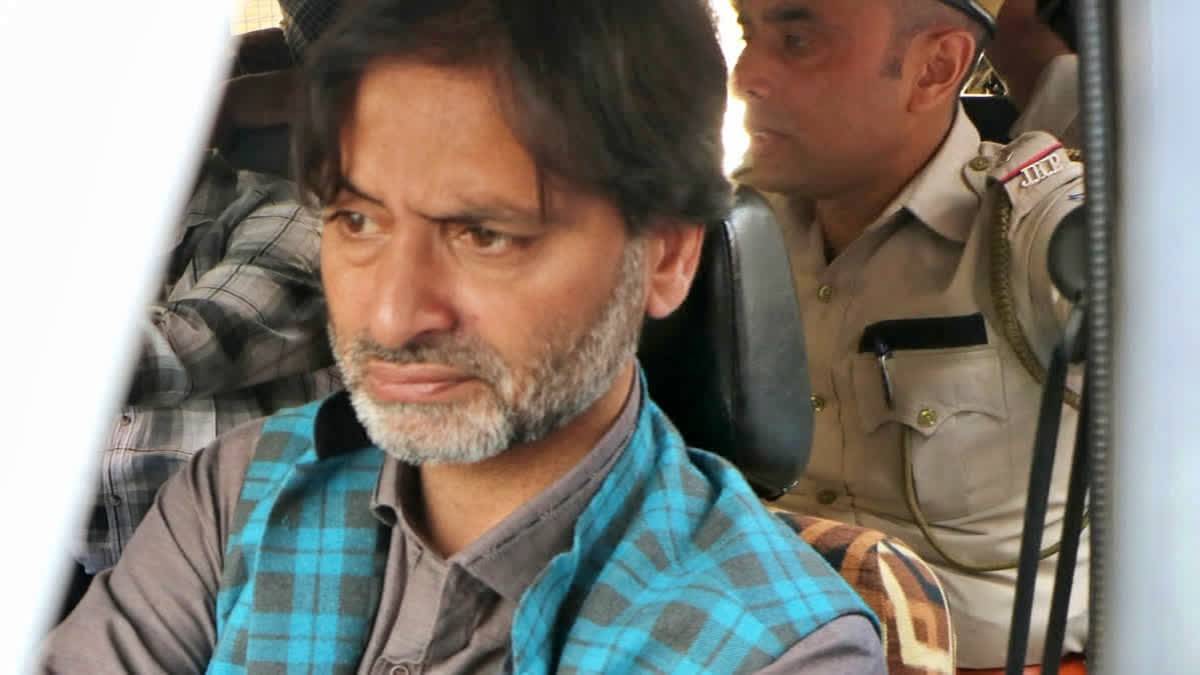New Delhi: The Supreme Court on Monday directed the registrar general of the Jammu & Kashmir and Ladakh High Court to ensure that the video conferencing facility is available at a special court in Jammu, which is hearing the 1989 Rubaiya Sayeed kidnapping and the 1990 Srinagar shootout cases involving jailed JKLF chief Yasin Malik and others.
Malik is currently lodged in Tihar jail in Delhi in connection with another terror financing case. The matter came up before a bench comprising Justices Abhay S Oka and Ujjal Bhuyan. The apex court directed the registrar general of the Jammu High Court to ensure proper VC facility for Malik to participate virtually in the court hearing and also asked the registrar technology of the Delhi High Court to check whether the VC facility at Tihar jail is working properly.
During the hearing, Justice Oka asked the CBI to show the court that Malik has refused to appear through video conferencing. Solicitor General Tushar Mehta, representing the CBI, said it is recorded in the order passed by the trial court.
Justice Oka asked Mehta to show where it is recorded in the order and pointed out that the court orders says that he is not appointing any lawyer. Mehta insisted that he is very clear that Malik is refusing VC facility, otherwise there cannot be an objection. “The judge says that the VC system is not working properly…”, Justice Oka pointed out.
Citing the trial court order, Mehta said the order says that accused number 1 (Malik) denied cross-examining the prosecution witness through virtual mode and has insisted on his physical presence before the court so that he can cross-examine the witnesses of the prosecution.
Mehta said the order also recorded that the accused number 1, does not want to engage any counsel nor does he want the services of any advocate. The bench, in its order, said: “The observations made by a third additional judge, Jammu, at two places recorded that the VC system in his court is not functioning properly. We direct the registrar general of Jammu and Kashmir to look into what is stated by the judge and take immediate steps for installing a proper system through which hearing can be properly conducted by using the medium of video conferencing”.
“The system should be such that there can be effective cross-examination….the registrar general should do the needful and submit a report to this court after deputing another registrar to examine the duly installed system. The report to be submitted by February 18, 2025. List on February 21, 2025”, said Justice Oka.
Mehta said the state would assist fully, and added, “What is happening is that respondent no. 1 (Malik) says I want to go there….”. Mehta made it clear that there is no issue of VC at Tihar jail and it also has a separate courtroom.
Justice Oka said the registrar technology/computers of the Delhi High Court to visit the facility in Tihar jail to find out whether the VC facility is good enough to enable Malik to cross-examine the witnesses in the trial, which is being conducted in a court in Jammu, and asked the Delhi High Court registrar to submit a report on February 18. The bench has scheduled the hearing on CBI’s plea on February 21.
The apex court was hearing a plea of the CBI seeking the transfer of the trials in the 1989 Rubaiya Sayeed kidnapping and the 1990 Srinagar shootout cases from Jammu to New Delhi so that Malik is not needed to be taken to the special court there.
In December, last year, the apex court had given six accused two weeks to respond to the CBI's plea to transfer the trial of the cases. One case relates to the killing of four Indian Air Force personnel on January 25, 1990 in Srinagar and the other to the abduction of Sayeed, daughter of then union home minister Mufti Mohammed Sayeed, on December 8, 1989. Malik, chief of the banned organisation JKLF, is facing trial in both cases.
The CBI moved the apex court against an order passed in September 2022, by a trial court in Jammu, directing Malik, serving a life term in Tihar jail, to be produced before it physically to cross-examine prosecution witnesses in the Sayeed case. The central agency had stressed that Malik was a threat to national security and cannot be allowed to be taken outside the Tihar jail premises.



